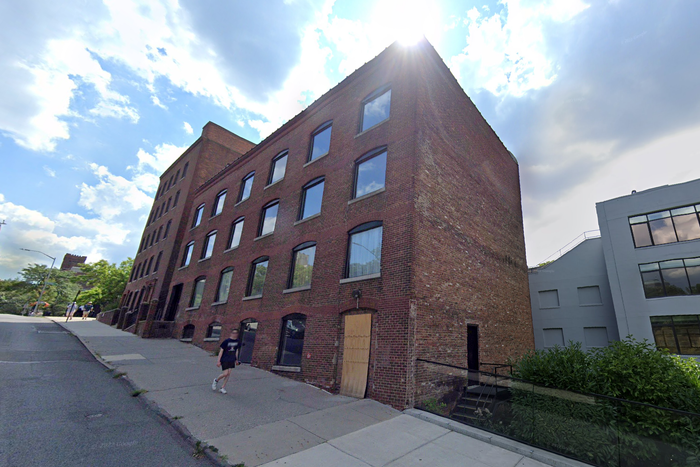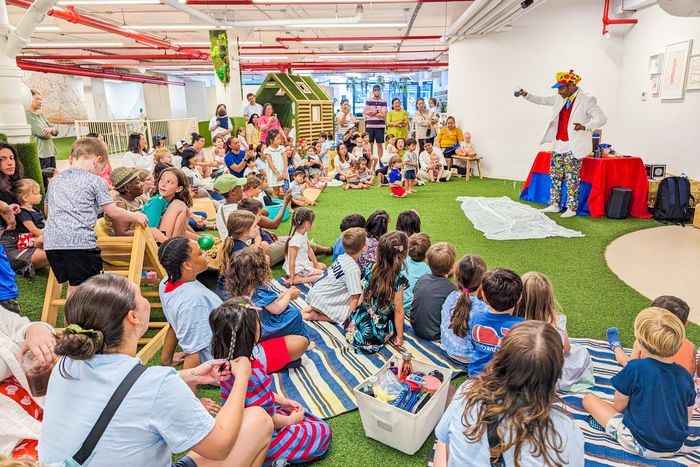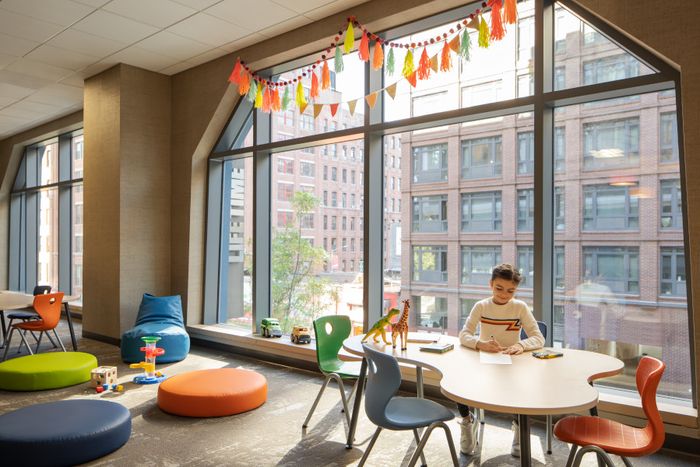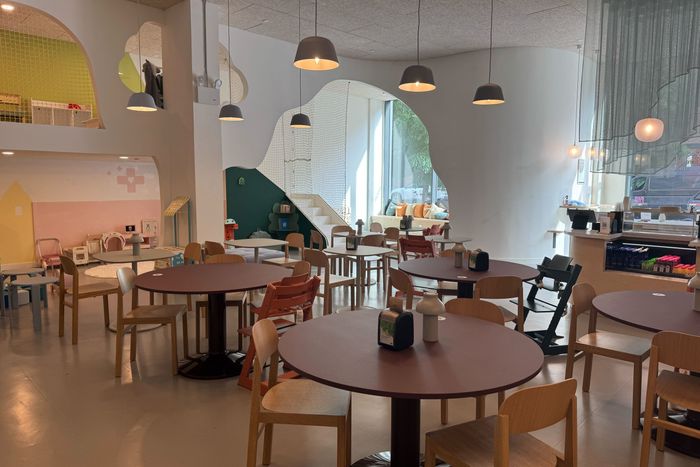Inside the Luxury NYC Private Clubs That Cater to Families

When it opens next summer, the Beginning, a private club in a brick 1860s Brooklyn Heights building, will have many of the trappings of the other members-only clubs popping up all over the city: a spa, library, Pilates classes, fine dining, a rooftop bar and restaurant. It will also include something that is unheard of: children. “We’re designing the space for families — not just for kids and not just for adults,” says Chris de Koos, who with Michael Schoen co-founded the Beginning. Parents will be able to drop their children off for a yoga or art class while they go to a HIIT session or grab a glass of rosé with a friend, then meet up with the kids again in the double-height play space or the pizza restaurant. For de Koos and Schoen, the Beginning fills a significant gap: providing a space where adults and kids actually want to hang out. “Usually there is nothing to do with kids indoors besides taking them to a crappy play space or to a restaurant where they’re not really welcome,” says de Koos.
Cathrine Andersen, the co-founder of House of Wonder, a café and play space that just opened in Clinton Hill, says that most indoor kids’ spaces are uncomfortable for the caregivers. “Play spaces get really stressful for parents — you need to run around after your kids the whole time, or there’s really no place to sit,” she says. Even the latest crop of Instagram-friendly play spaces like Space Club in Fort Greene skew heavily kid — adults won’t be miserable there but would never go on their own. House of Wonder, on the other hand, bills itself as an “a play space made for parents.” As Andersen says, “We wanted a place where you can get food that’s actually good with friends while your kids play.”
The Beginning, opening next summer, will be located in a brick 1860s building in Brooklyn Heights.
Photo: Google Maps
And, perhaps, make friends. Karl Chong is the co-founder of Cocoon, a members-only play space full of natural wood and Montessori-inspired climbing structures that opened in Tribeca in 2020 and recently added a second location on the Upper West Side. He says he and his business partners were also looking to provide parents with a way to connect and build friendships that doesn’t involve awkwardly asking for a number at a playground or on the last day of a parent-child class. Chong, who went from being the CEO of Groupon Singapore to a stay-at-home dad in Battery Park City after his son was born, says that while he really loved having the time with his kids, he often found it to be a lonely experience. “Making new friends as a stay-at-home dad was a difficult and awkward experience,” he says. “I wanted to bridge those gaps and find a way to create the spark of new friendships.” When I met him and co-founder Jenny Lo at Cocoon Tribeca on a recent weekday morning, the space — pleasant, clean, and pretty calm — was mostly occupied by nannies and their charges, but Chong assured me that on weekends it was packed with parents, who can grab a beer or wine from the fridge while their kids clamber up and down climbing ropes. There are postpartum classes open to nonmembers on a sliding fee scale and curtained-off nursing areas, and the idea is that parents join with newborns and stick around until the second grade or so.
To differentiate themselves from traditional kiddie-land, the spaces lean decidedly upscale. As Schoen told me, he sees the Beginning client as the “Soho House member of the past who’s had children.” (The Beginning’s interior designer is James Thurstan Waterworth, the former European design director of Soho House.) Schoen says it won’t read like a play space, not even one of those nice Scandi-inspired ones: “There’s no reason why you can’t make spaces that are cohesive and design-led for families where parents actually want to spend time,” says de Koos. “Your house doesn’t look like a playground. Why shouldn’t we have copies of great Miros and not just primary colors?” Canopy, a play space in Williamsburg for the 4-and-under set with a large array of pre-postpartum classes, looks like an archetypal Brooklyn loft, with hardwood floors and huge arched windows, the kind of place where you might have taken a yoga class in 2002. Only now, it’s stocked with sheepskin rugs, diapers, and a kitchen with coffee and Goldfish crackers on tap. Cocoon has fruit and lemon- and lime-infused waters, high speed internet, a climbing web that North Carolina artists spent a week handweaving.
Cocoon’s Tribeca location is full of nature-inspired play structures, including a handwoven climbing web.
Photo: Cocoon
These places are expensive, of course. Some, like the Beginning, use a membership model, with child-care costs baked into the monthly fees. Others, like House of Wonder, are open to drop-ins but require parents to watch their own kids. The Beginning is still setting its rates, but they’re likely to start around $300 per month per adult and $200 per kid. That’s augmented by an initiation fee, probably several thousand dollars, and membership will include a set number of hours of child care with an option to purchase more.
That’s similar to what Life Time, the upscale athletic club that offers child care and programming at two of its New York locations (Dumbo and One Wall in the Financial District), charges, sans initiation fee: $329 for the first member and $100 per child. Life Time’s business is framed a little differently, though: While its overall branding leans more sleek and toned than tot-spot, the company has amped up its children’s offerings in the last decade so that parents don’t have to drop off their kids guiltily to stare at a screen in some basement playroom while they knock out reps. Whereas places like House of Wonder and Cocoon are play spaces that also cater to adults, and Beginnings is creating a clubhouse with offerings for both, Life Time has evolved from a place for adults serious about working out — and might need someone to watch their kids while they do — to a place that now has robust programming for both. It went from “iPads and games” to “kids being engaged from the moment you drop them off in yoga classes, art, crafts, homework help,” says Natalie Bushaw, its vice-president of corporate communications.
The children’s play area at Life Time’s Dumbo location.
Photo: Joe Thomas/Lifetime
Paula S. Fass, a professor of history at the University of California at Berkeley who wrote The End of American Childhood: A History of Parenting From Life on the Frontier to the Managed Child, pointed out that combining social, nonwork activities and child care is nothing new: Churches and synagogues always had a form of it. Nor is socializing while your kids go off and play together: In the 1950s, it was common for mothers to meet for coffee and send their kids off into the backyard. Since those things have largely fallen by the wayside for many families, these spaces certainly make sense. Of course, she added, it would be nice if we had more clean public spaces where kids and adults can hang out together when being outdoors wasn’t an option: community centers, say.
Given that these are long-standing needs, why now? Well, for one thing, falling commercial rents have made these family clubs newly viable, says Schoen, and many landlords are receptive to experiential uses as opposed to restaurant, retail, and office space. The Beginning’s space at 50 Columbia Heights is 45,000 square feet. (It’s just leased a 50,000-square-foot space in Philadelphia, too.) Schoen said they couldn’t disclose the rent on the Brooklyn Heights space, but according to the Real Deal, rents in the neighborhood typically range from $80 to $200 per square foot, and a broker pointed out that the space has been vacant for some time. All the parents who now telecommute want to get out of the house now and then, too, and these are places where they can settle in with a laptop and get some work done while the kids run around instead of watching a screen. Since the parents are on the premises, these businesses also duck the mountain of regulations and headwinds that make traditional child-care facilities a difficult business.
The café area of House of Wonder will serve Nordic-style open sandwiches and coffee.
Photo: House of Wonder
That doesn’t mean that any big empty commercial space will do. “If you’re running a real private club, you have an idea of what you want it to look like, and it’s probably not going to be three vacant floors of an office building,” says Nick Farmakis, a vice-chairman at Savills, a commercial brokerage. Andersen says that they toured a lot of storefront spaces before settling on House of Wonder’s spot at the base of a new residential building on the corner of Fulton and Grand, which has nice natural light. It’s also square (unlike most storefront retail, which is rectangular), so the play area can wrap around the café, allowing parents to keep an eye on their kids as they sit with their coffee. (Clear sight lines, several people noted, allow parents to relax and socialize.) These clubs also need enough square feet to keep things from feeling chaotic or cramped, and employees to supervise a range of ages — from newborns to perhaps tweens — in addition to restaurant staff, fitness instructors, and all the rest. Farmakis agreed that the appeal was obvious — what he called “controlled hospitality environments” are having a moment. “There is that push for a third space,” he says. “People with money will pay. But then can you make money from it?”
Source link










